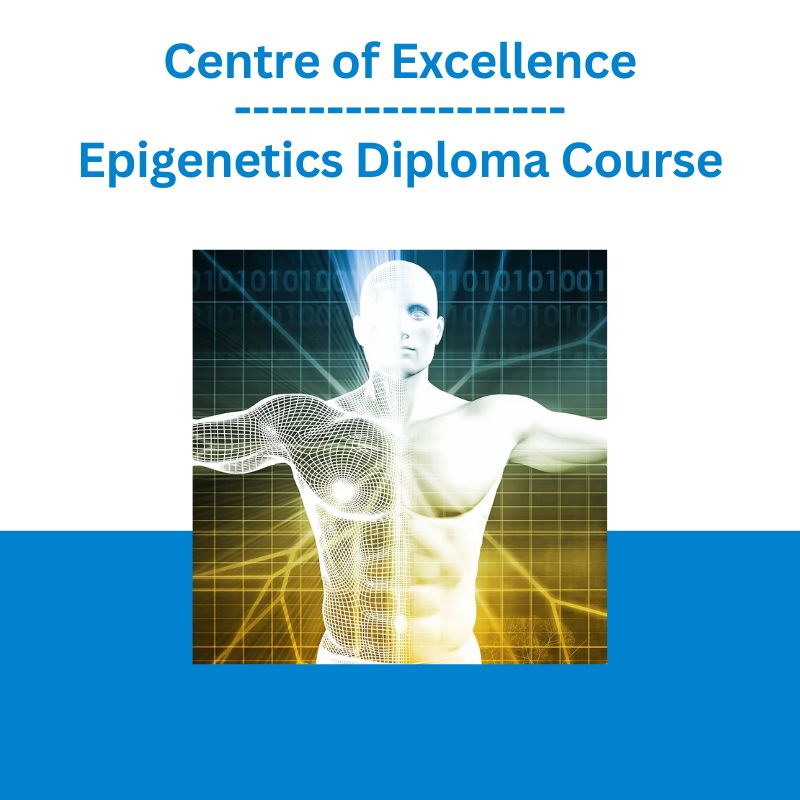*** Proof of Product ***
Exploring the Essential Features of “Centre of Excellence – Epigenetics Diploma Course”
What Will You Learn?
The Epigenetics Diploma Course takes the complex subject and breaks it down into easy-to-understand modules, so you’ll be able to gain scientific knowledge in an accessible way and come away well-informed and in-the-know about everything to do with epigenetics.
What is epigenetics? This epigenetics training course begins by answering this with a brief overview of the subject and a look at the difference between neuroepigenetics and traditional epigenetics.
You’ll learn about a crucial concept in epigenetics – modifications. We’ll look at various types of modifications, including DNA methylation, histone acetylation, histone modification, nucleosome positioning and RNA-based regulation.
The Epigenetics Diploma Course covers everything you need to know about chromatin – dynamic chromatin structure and hierarchy, methods to investigate chromatin, and chromatin as it relates to DNA repair.
We look at mechanisms, including covalent modifications, RNA transcripts, mRNA, sRNAs, prions, structural inheritance, and more.
You’ll discover how nutritional epigenetics works, in terms of health and disease, and take a look at cancer epigenetics. Following a brief explanation on cancer epigenetics, the Epigenetics Diploma Course takes you through MicroRNA gene silencing, metabolic recoding and more, before moving on to different types of cancer, including skin cancer, prostate cancer, cervical cancer, and sarcoma.
The Epigenetics Diploma Course covers various topics within human epigenetics. These topics include Barr body formation, genomic imprinting in human disease, disorders in humans connected with imprinting, and developmental diseases caused by epigenetic malfunctioning.
Course Syllabus
What will I learn on the course?
Module 1: The Study of Epigenetics
7 parts
Introduction
Part 1: What is Epigenetics?
Part 2: Neuroepigenetics vs Traditional Epigenetics
Part 3: Epigenetic Marks
Test Your Knowledge
Key Learning Points Exercise
Module 1 Assessment
Module 2: Types of Modifications
8 parts
Part 1: DNA Methylation
Part 2: Understanding Histones
Part 3: Histone Modification
Part 4: Nucleosome Positioning
Part 5: RNA-Based Regulation
Test Your Knowledge
Key Learning Points Exercise
Module 2 Assessment
Module 3: Chromatin
7 parts
Part 1: Dynamic Chromatin Structure and Hierarchy I
Part 2: Dynamic Chromatin Structure and Hierarchy II
Part 3: Methods to Investigate Chromatin
Part 4: Chromatin and DNA Repair
Test Your Knowledge
Key Learning Points Exercise
Module 3 Assessment
Module 4: Mechanisms
8 parts
Part 1: Covalent Modifications
Part 2: RNA Transcripts
Part 3: mRNAs and sRNAs
Part 4: Prions and Structural Inheritance
Part 5: Nucleosome Positioning
Test Your Knowledge
Key Learning Points Exercise
Module 4 Assessment
Module 5: Nutritional Epigenetics
8 parts
Part 1: Nutritional Epigenetics Explored
Part 2: Nutritional Epigenetics in Health and Disease
Part 3: Life-Long Susceptibility to Disease
Part 4: Nutritional Epigenetics and Cancer
Part 5: The Future of Nutritional Epigenetics
Test Your Knowledge
Key Learning Points Exercise
Module 5 Assessment
Module 6: Cancer Epigenetics
8 parts
Part 1: MicroRNA Gene Silencing
Part 2: Metabolic Recoding of Epigenetics in Cancer
Part 3: MicroRNA and DNA Repair
Part 4: DNA Repair Pathways
Part 5: Types of Cancer
Test Your Knowledge
Key Learning Points Exercise
Module 6 Assessment
Module 7: Human Epigenetics – Barr Body Formation
8 parts
Part 1: The Role of Xist
Part 2: Dosage Compensation
Part 3: Random Early X Chromosome Inactivation
Part 4: Silencing of Genes
Part 5: X Chromosome: X Inactivation
Test Your Knowledge
Key Learning Points Exercise
Module 7 Assessment
Module 8: Human Epigenetics – Genomic Imprinting in Human Disease
6 parts
Part 1: DNA and Genetic Mutations
Part 2: The Role of Imprinting in Human Disease
Part 3: Establishment and Maintenance
Test Your Knowledge
Key Learning Points Exercise
Module 8 Assessment
Module 9: Human Epigenetics Disorders Associated with Imprinting
7 parts
Part 1: Male Infertility
Part 2: DIRAS3
Part 3: Beckwith-Wiedemann Syndrome
Part 4: Silver Russell Syndrome
Test Your Knowledge
Key Learning Points Exercise
Module 9 Assessment
Module 10: Human Epigenetics – Developmental Diseases caused by Epigenetic Malfunctioning
7 parts
Part 1: Prader Willi Syndrome (PWS)
Part 2: Angel Man Syndrome and Rett Syndrome
Part 3: Fragile X Syndrome
Conclusion
Test Your Knowledge
Key Learning Points Exercise
Module 10 Assessment
Who Would Benefit from This Course?
The Epigenetics Diploma Course will be of interest to anyone who wishes to explore this exciting branch of science, from all angles and disciplines, to gain an understanding of heritability, disease, and much more.
Please see the full list of alternative group-buy courses available here: https://lunacourse.com/shop/









